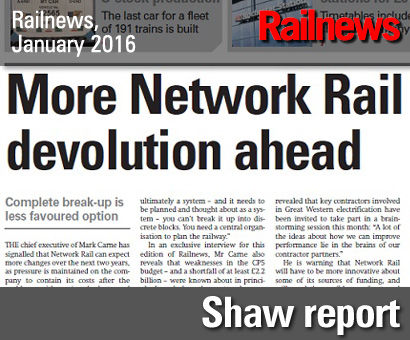NETWORK RAIL privatisation has been ruled out by Nicola Shaw in her analysis of the future financing and structure of the company. She says: "The report team has dismissed privatisation of the whole company, and instead has focused on solutions that may be appropriate for certain parts of Network Rail as well as for specific enhancement projects."
Her recommendation was foreseen in early January when Railnews published an exclusive interview with Network Rail chief executive Mark Carne, in which he said: "I am not in favour of breaking up Network Rail. What I am in favour of is increased devolution to regional businesses. The first stages several years ago were around operational management of the railway. But what we are now talking about is proper route-devolved businesses where they are actually accountable for the planning of the railway."
Nicola Shaw, who is chief executive of HS1, has ruled out a complete sale but says new sources of finance should be sought: "Further options for involving private sector finance – for example, from letting a concession, or involving suppliers in technological investment – should be explored to release government capital, encourage innovation, and speed up delivery of improvements for passengers."
In all, there are seven main recommendations. Apart from new ways of raising funds, the others include placing 'the needs of passengers and freight shippers at the heart of rail infrastructure management' with train operators 'recognising they are sharing use of the network with others and operating within a national (and international) system'.
Devolution has stayed on the agenda, with each route set to play a greater role. The report calls for 'a step-change in the degree of autonomy of these routes to deliver more flexibly and responsively for their customers'.
There should be a greater emphasis on the North of England, with a new NR route created to concentrate on the region and work with Transport for the North and other bodies, while the report also urges better clarification of the government's role in the railway in general and Network Rail in particular. It continues: "As the body responsible for transport in England and Wales, the DfT should also develop a visible longer-term strategy for rail travel, coordinating as appropriate with the governments of Scotland and Wales."
Other recommendations say the railway should be planned to meet the needs of its customers, and that there should also be 'industry-wide plans to develop skills and improve diversity'. It comments: "People are one of the railway’s greatest assets. But the industry as a whole needs to support and grow the pool of skilled and talented people working in the railway better."
Nicola Shaw concludes: "The recommendations I make seek to enable the industry – and government – over time, to address these issues. It will ultimately be for Network Rail and the Department for Transport, as the organisations most directly affected by my proposals, to take responsibility for their implementation, working with the ORR, Transport for the North, and the industry more widely.
"Some respondents to our consultation noted the risk associated with rushed implementation. On the other hand, introducing change too slowly also carries risk (including, for example, uncertainty for people about their future role) and therefore a fine balance needs to be struck. It should be achievable for my proposals to have been implemented by 2019."
Network Rail chief executive Mark Carne said: “I welcome Nicola’s report and her engagement with us and the industry in developing it.
“I’m pleased that she has concluded that the reforms we are introducing in Network Rail are the right ones. We are committed to putting passengers and customers at the heart of what we do and our devolved business model will put decisions in the routes, closer to the passengers and train companies.
“I also endorse her desire to see more private finance coming into the railways. We have been successful with this in the past and I consider that more private money and funding from the people who will benefit from railway improvements is a sensible way to deliver a bigger and better railway for the nation.
“We’ll work with the Department for Transport as they now consider these recommendations and we look forward to a future which I genuinely believe is bright for the railways and for the ever growing number of passengers.”
The RMT, which had campaigned vigorously against a possible reprivatisation of Network Rail, said it would continue to oppose any asset sales. The union's general secretary Mick Cash said: "Although a strong union campaign has fought off the prospect of wholesale and early reprivatisation the Shaw Report still opens the door to a sell off of some of Britain's last remaining publicly-owned rail assets. This is the Tories looking to knock down what's left of the family silver as Osborne scrambles to plug the gaping holes in his budget. Foreign speculators will be queuing up again to plunder Britain's railways for every last penny in the same way as they have mopped up train operations and run them into the ground."
ASLEF general secretary Mick Whelan said: "‘The Shaw report was published at 14.00 today, just after the Budget, in the hope that nobody would notice,’ said Mick. ‘It was, the Treasury thought, a good way and a good day to bury bad – or, at least, embarrassing – news. Because what a waste of time and money this has been! While we welcome the news that Network Rail is not going to be fully or partially privatised – and those were the signals we were getting – everyone can see it hasn’t been a good use of taxpayers’ money.
"Shaw, at least, has seen sense and is not trying to further fragment our railway. The report has not delivered, I suspect, what the Chancellor was hoping."


